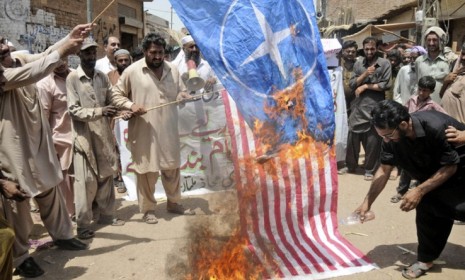Are Obama's drone strikes decapitating al Qaeda?
The secretive aerial campaign is facing scathing criticism from human-rights activists and Pakistani officials, but it may well be helping in the war on terror

A free daily email with the biggest news stories of the day – and the best features from TheWeek.com
You are now subscribed
Your newsletter sign-up was successful
President Obama's increasing use of covert airstrikes against suspected terrorist leaders isn't doing wonders for Washington's relationship with Pakistan... but it appears to be doing some serious damage to al Qaeda. The drone attack that killed the terrorist network's second-in-command Abu Yahya al-Libi this week was only the latest in a string of attacks against suspected terrorist leaders in Pakistan's tribal areas along the Afghan border, as well as in Yemen and Somalia. Last year, similar airstrikes killed the previous al Qaeda No. 2 leader in Pakistan, as well as the leader of the organization's Yemen affiliate. Is there really a chance that the controversial drone campaign could effectively eliminate the top layer of al Qaeda's leadership?
Yes. The drones are stripping terrorists of their leaders: The success of the attack on Libi "considerably weakens Islamabad's case against drone strikes," says Yashwant Raj at India's Hindustan Times. Libi, a respected religious leader, "is said to have made al Qaeda 'cool' through the use of social media," and he'll be hard to replace. But it's the loss of one deputy after another that "will make it difficult for post-bin Laden leadership" to maintain control of the rank-and-file.
"Al-Libi dead, Pak case against drones weakens"
The Week
Escape your echo chamber. Get the facts behind the news, plus analysis from multiple perspectives.

Sign up for The Week's Free Newsletters
From our morning news briefing to a weekly Good News Newsletter, get the best of The Week delivered directly to your inbox.
From our morning news briefing to a weekly Good News Newsletter, get the best of The Week delivered directly to your inbox.
No. Al Qaeda will find a way to carry on: "The global jihadist movement is remarkably resilient, despite its loss of leaders," says Frank Gardner at BBC News. It lost its training camps when the U.S. invaded Afghanistan in 2001, and simply hopped over the border into Pakistan. Al Qaeda has always found new leaders to replace the ones taken out by drones. Wherever there is "weak and corrupt governance," and deep resentment against the U.S. and Israel, terrorists have endless pools of recruits.
"Can al Qaeda survive the drone strikes?"
If anything, drones make matters worse: Don't let the drone campaign's successes fool you, says the United Arab Emirates' Khaleej Times in an editorial. This increasingly aggressive kind of cowboy gun-slinging is fraying Washington's ties with the Pakistani government, an ally it needs to win this war. Continuing to send drones to fire into civilian areas will only "trigger a rise in the level of extremism" al Qaeda feeds on, and make it easier for terrorists to find refuge among an increasingly disgusted population.
A free daily email with the biggest news stories of the day – and the best features from TheWeek.com
-
 6 exquisite homes with vast acreage
6 exquisite homes with vast acreageFeature Featuring an off-the-grid contemporary home in New Mexico and lakefront farmhouse in Massachusetts
-
 Film reviews: ‘Wuthering Heights,’ ‘Good Luck, Have Fun, Don’t Die,’ and ‘Sirat’
Film reviews: ‘Wuthering Heights,’ ‘Good Luck, Have Fun, Don’t Die,’ and ‘Sirat’Feature An inconvenient love torments a would-be couple, a gonzo time traveler seeks to save humanity from AI, and a father’s desperate search goes deeply sideways
-
 Political cartoons for February 16
Political cartoons for February 16Cartoons Monday’s political cartoons include President's Day, a valentine from the Epstein files, and more
-
 The billionaires’ wealth tax: a catastrophe for California?
The billionaires’ wealth tax: a catastrophe for California?Talking Point Peter Thiel and Larry Page preparing to change state residency
-
 Bari Weiss’ ‘60 Minutes’ scandal is about more than one report
Bari Weiss’ ‘60 Minutes’ scandal is about more than one reportIN THE SPOTLIGHT By blocking an approved segment on a controversial prison holding US deportees in El Salvador, the editor-in-chief of CBS News has become the main story
-
 Has Zohran Mamdani shown the Democrats how to win again?
Has Zohran Mamdani shown the Democrats how to win again?Today’s Big Question New York City mayoral election touted as victory for left-wing populists but moderate centrist wins elsewhere present more complex path for Democratic Party
-
 Millions turn out for anti-Trump ‘No Kings’ rallies
Millions turn out for anti-Trump ‘No Kings’ ralliesSpeed Read An estimated 7 million people participated, 2 million more than at the first ‘No Kings’ protest in June
-
 Ghislaine Maxwell: angling for a Trump pardon
Ghislaine Maxwell: angling for a Trump pardonTalking Point Convicted sex trafficker's testimony could shed new light on president's links to Jeffrey Epstein
-
 The last words and final moments of 40 presidents
The last words and final moments of 40 presidentsThe Explainer Some are eloquent quotes worthy of the holders of the highest office in the nation, and others... aren't
-
 The JFK files: the truth at last?
The JFK files: the truth at last?In The Spotlight More than 64,000 previously classified documents relating the 1963 assassination of John F. Kennedy have been released by the Trump administration
-
 'Seriously, not literally': how should the world take Donald Trump?
'Seriously, not literally': how should the world take Donald Trump?Today's big question White House rhetoric and reality look likely to become increasingly blurred